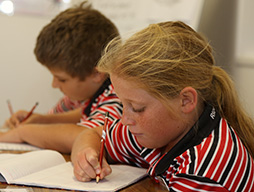Teaching and learning
At Ridgelands State School we follow the requirements for Queensland state schools in implementing both the Australian Curriculum and the Queensland Curriculum. Our Whole School Curriculum document explicitly details curriculum and assessment across all year levels and is used by teachers to plan teaching practices that promote successful learning for all students. 
High quality teaching, focused on the achievement of every student, is integral to improving learning outcomes and building a culture of ongoing improvement. School wide analysis and discussion of student achievement data, teaching strategies delivered in response to students' needs and context and differentiated learning with focused support for students' social and emotional development ensures continuity and progression of student learning across the years of school. Our school-wide pedagogical framework articulates clear expectations about teaching.
Ridgelands school teachers use a variety of teaching practices across all curriculum areas and incorporate inclusive teaching strategies that enable all students to learn and engage with the curriculum in the classroom. In any classroom there is a wide range of learners and a wide range of learner needs that teachers take into account in their planning, teaching and assessing.
We continually improve our teaching practices and student learning through identifying priorities for improved student outcomes through clearly written measurable goals. Goals articulate high expectations for teaching and student learning. Student data is collected and analysed regularly to monitor progress towards achievement of the goals.
When introducing new concepts, Ridgelands State School teaching practice demonstrates all aspects of the Explicit Instruction teaching sequence as outlined by CQ region. Explicit Instruction aspects include Orientation (Learning intent, Success criteria, Lesson warm ups), Engagement (I do, We do, You do) and Conclusion (Plough back).
Engagement phase (I do) of lessons is achieved through using clear and concise language, providing examples and non-examples, providing step by step demonstrations and monitoring student understanding closely.
Conclusion phase of lessons is achieved through reviewing lesson goals and expectations, reviewing key features of the new learning, checking student understanding and planning opportunities for further practice (homework, 3Rs).
Rapid Recall Routines (3Rs) are used as part of daily practice to revise and reinforce learning.
Other examples of quality teaching practices that our teachers implement include:
arranging multiple opportunities for students to take in the core information or concepts;
using a variety of ways to make sense of ideas (presenting in different formats or styles);
using a range of opportunities to demonstrate what has been learnt;
providing quality learning experiences for all students regardless of their starting points;
using the P-12 Curriculum Framework documents to plan learning experiences;
preparing for the future;
adapting for different skill levels;
adjusting the amount of 'output' required;
using peer and team work;
link learning to real-world purposes;
direct teaching of routines and organisational strategies;
accessing technology;
engaging in team work - using AVTs, teacher aides, year or subject area teaching teams in all stages of the curriculum cycles.
Accelerated learning
Ridgelands school recognises its responsibility to make adjustments for students who are gifted and talented. Teachers set the curriculum at a level, pace, degree of abstraction and complexity beyond learning expectations for their age peers. We cater for gifted and talented students’ specific learning needs through a differentiated curriculum, enrichment, subject/learning area acceleration and/or whole year level acceleration. Refer to ‘Gifted Students’.
Learning support
Some students have difficulties learning to read, write or work with numbers due to a range of reasons, for example a disability, transience or missed schooling due to illness. We identify and respond to learning needs regardless of cause, through ongoing monitoring and assessment of student progress. Our school support students by using differentiated teaching practices, assistive technology and where necessary focused and intensive teaching. Refer to ‘Student services and support programs’.
Indigenous perspectives
Indigenous perspectives are incorporated in curriculum across all year levels. Teachers explicitly teach Aboriginal and Torres Strait Islander studies and content. It is recognised that indigenous and non-indigenous students alike benefit significantly from programs that encompass aspects of the contemporary cultural heritage and lifestyle of Aboriginal and Torres Strait Islanders, as well as the historical and traditional aspects of their history. Furthermore, indigenous students benefit greatly from culturally inclusive school environments that recognise and support their particular needs.
Specialist lessons
Each week students are offered instruction in Music by a visiting specialist teacher whilst LOTE instruction is delivered by a specialist classroom teacher.
Languages Other Than English (LOTE) are an important part of the Queensland state school curriculum. Japanese is currently being offered in our primary school setting. Japanese studies focus on developing language proficiency and promote intercultural understanding. Studying a language better equips students to engage with others and participate fully in an increasingly globalised world.
Music instruction encourages students to participate in a variety of musical activities/games, which develop skills, and understanding of musical elements. Reading and writing music, singing, playing, inventing and listening form the basis of the Music education program. Learning to play the recorder in years 5 and 6 helps to improve the students’ literacy. It prepares them for learning other instruments by teaching them reading and playing skills, as well as establishing a regular practice routine.
Physical Education lessons aims to give students 30 minutes of moderate physical activity each day, assisting students in developing their gross motor skills. Students also develop skills required to participate in different sports and disciplines.